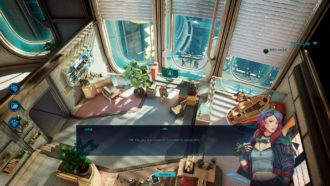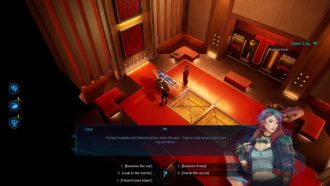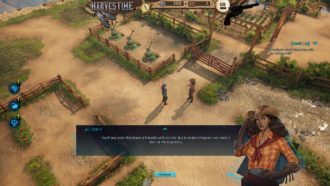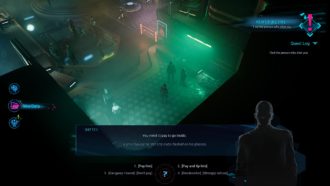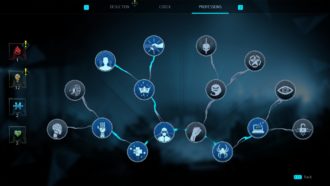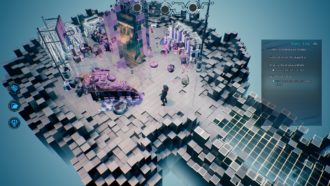Platform:
PC
Released:
September 16, 2021
Publisher:
Anshar Publishing
Developer:
Anshar Studios
I’ve been waiting for the release of Gamedec, the top-down narrative Cyberpunk RPG since I played the demo at PAX Australia’s online event last year. I remember being intrigued by the games premise, its artistic graphics and its focus on the player making their own choices that actually matter throughout the gameplay. I’ve now spent a lot more time in this Cyberpunk world where you play as an online detective called, you guessed it, a Gamedec. While the premise is certainly interesting, some strange design decisions prevent it from being a virtual world that you want to truly strap into for long periods of time.
The narrative sees your Gamedec jumping between different virtual worlds they have been assigned to explore based on the needs of their clients. In these worlds, which all have different vibes and therefore, much different clienteles, their seems to be a similar issue running through all of them. As you go deeper and deeper into each case and explore the darker side of Gamedec’s online Vertualium, you’ll find yourself wondering who you can trust and who may be out to kill you….
As this is a narrative game, it’s good that the dialogue between characters is fast paced and unique to each interaction – I was never bored when meeting new people, chatting with them and trying to find out how they could help me with my investigation. Gamedec literally shows you, through a barometer as interview a suspect, if you are winning them over or not. This means that if you see the slider moving more towards the “distrust” side you’re given the heads-up that what you’re doing is definitely not winning favour with the person you’re talking to. Also, the dialogue option you choose opens or closes other branches of dialogue, showing that these choices really do matter.
The game has advertised itself as being one where every single Gamedec is different based on the players play style and choices. Therefore, it allows players to pick between a number of options when first creating their character and before the narrative kicks off. The character creator is obviously your first stop on this Sci-Fi ride and I’m disappointed to say that its options were underwhelming. There were a number of aspects of the creator, such as there only being the two “standard” choices for both body type and pronouns that left me thinking “really?! It’s 2021 guys!” There is no real versatility or option for the player to improve this as you have 18 skins to choose from and therefore you don’t have freedom to create your own character visually from scratch.
The creator is also confusing due to a problem with the game’s dialogue. When I first started playing the game the text was half Russian half English, an issue that the Gamedec devs are still ironing out according to players on Steam who are still running into the dialogue being a combo of Russian, English and Polish. As Gamedec has no voice acting, the written dialogue is obviously a massive element of how the game flows.
The creator consists of players being able to choose their character’s name, their origin (Low City or High City) and their “values” which gives you a number of starting attributes. The “values” which cover hedonism, power and tradition aren’t explained and neither are the skill points that are given to you in order to embody these values. Instead the skill point categories are represented by four symbols – fire, a light bulb, a jigsaw piece and a heart. You receive points towards these categories when your Gamedec makes a decision that focuses on one of them. I like this aspect of the game as it shows you how your decisions impact the gameplay; however, I still wanted to know more about how these decisions impacted the game. For some reason, Gamedec likes to keep this information close to their chests….
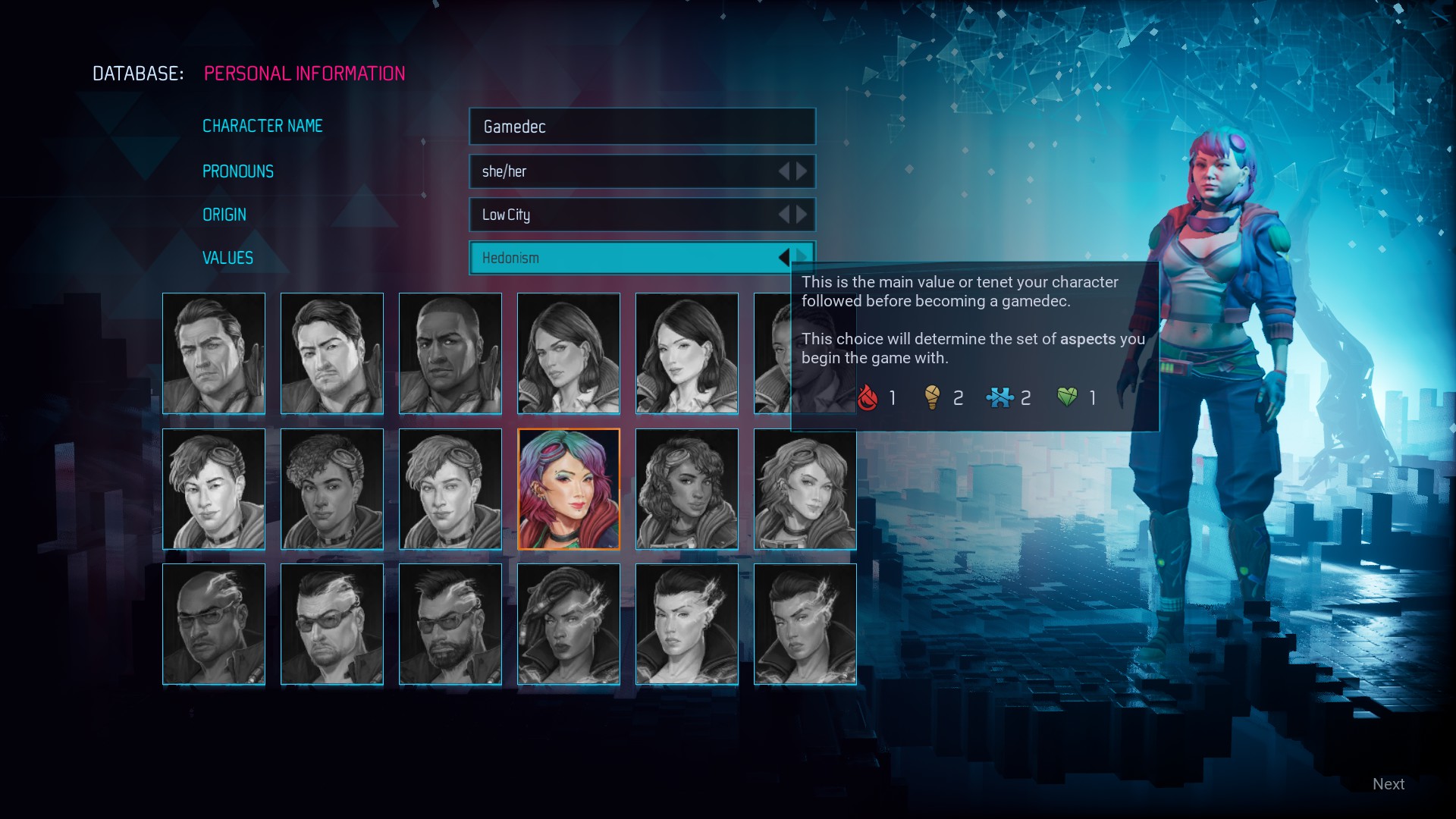
However, there are a lot of positive aspects of Gamedec that kept me hooked. For one, it is gorgeous to look at. Its top-down style makes you feel as if you are looking into a complex diorama, with the rich colour palette increasing the beauty of each setting the game propels you into.
The environments in this game are commendable; there are quite a few places for you to explore and that’s one reason why the game never feels stale. Most of these fall into the Vertualium, this cyber world is obviously more exciting than reality, or Realium, as the game calls it and therefore, your Gamedec is always busy with cases to crack.
You do spend most of your time in Vertualium and only really stay long enough in Realium to catch your breath and pick up your next case. These online worlds work so well as they are based on the popularity of certain corners of the internet as we know it now. The first you dive into, Twisted and Perverted, focuses on BDSM and therefore explores the fine line between pleasure and pain. The grittiness of the streets with their dark shadows and leather cladded occupants gives the setting a great mixture of perversion, excitement and mystery.
Harvest Time, the next online world you find yourself in is the exact opposite and shows the artistic scope of developer Anshar Studios. Set in an online wild wild west the colour palette is based not on an urban environment but the shades you’d expect of a farming sim. Greens, browns, burnt oranges, Gamedec really captures the feel of these games and even incorporates farming elements that you can spend time exploring if you wish. There are a number of other colourful Vertualium worlds to explore but I don’t want to ruin the twists and turns the game sends you on. I will say however, that the set design is the jewel in Gamedec’s crown.
“The first world you dive into, Twisted and Perverted, focuses on BDSM and therefore explores the fine line between pleasure and pain…”
The main focus of character development is obviously the protagonist, who can be levelled up based on your choices. There are four major skill tree paths that you can choose for your protagonist to master. These are tech wiz (Glazier) brawn (Sleeve) charisma (Infotainer) and med expert (Scalpel). To progress up the skill tree, you need to gain the value points needed for each upgrade. These are given to you when you make certain narrative choices throughout the game.
Some of your character’s actions and dialogue can only be explored if you have a levelled up a particular skill. It actually made me excited to see that I didn’t meet the criteria to explore certain options in the game as my skill tree did not include the attributes I needed to do so. It meant that the choices the player made, even when it came to putting points into their skill tree, mattered. Even though skill point categories don’t come with titles, if you hover over each symbol, it comes up with characteristics that your choices have focused on. For example, in the jigsaw symbol, which I can only guess stands for rationality, you have a number of sub categories such as rules, calm, caution, logic and several others that each have their own barometer that increases or stays the same based on whether your choices tick those particular categories. I loved the intricacy of this system, even if the game doesn’t let the player fully comprehend it.
There are a number of elements in the game that are a bit bloated, mainly in regard to characters and narrative. There are so many characters that it’s hard to really feel a connection with any of them. It reminds me of adding toppings on a sundae; as a kid you were like “give me alllll the stuff!” and loaded it with every single thing that could fit into your bowl. What you came up with was a combination of strong flavours that blended in together and therefore, not one stood out as special. It would have been a better option for the devs to include less characters but given these characters more screen time and therefore the player could have grown some sense of affinity towards them.
The narrative itself is well written for the most part, with the devs delivering an intriguing story with many twists and turns. Gamedec’s world is also covered in delicious lore that I wish was given more screen time. Sure, you can check it out in the Codex, but it would have been nice for the devs to include more of these elements, such as Gamepill, a pill someone takes if they are going to spend more than an hour in Vertualium and helps their body to stop the urge to defecate and urinate. This is the stuff that I love in narratives; the little things that authors include to make the world that little bit more exciting and real. Gamedec is a fully functional world, and its these little details that help both the Vertualium and Realium full of colour and life.
Language glitches made me cringe a lot of the time, mainly because I had the game’s characters use pronouns that did not relate to the ones I had chosen. All good if this was the game commenting on non-binary politics, but alas, the same people would address my character by different pronouns. Also, characters I had never met would tell me that I had treated them badly in the past and the game would indicate that because of this, the narrative of the game had been altered. It is little things like this that made the game feel unfinished or like it needed some more time to iron out the kinks before releasing.
6
Decent
Positive:
- World is interesting and well thought-out
- Different settings make for exciting gameplay
- "Choices matter" makes for a unique narrative experience
Negative:
- Narrative, though interesting, is longwinded
- Language glitches make the game seem unfinished
- Lacks information about skills attributes
- Character creator is lacking in depth
- Too many characters, not enough character development
The genre of Cyberpunk has been the “in” thing for a while now and I’m not sure why but it seems to get it right. It may be that the world is so complex and filled with so much grey within the black and white that games struggle with adding in the tiny touches that make Cyberpunk worlds really come alive. Gamedec has the lore, but it doesn’t go that extra step further to really incorporate it into the world. Gamedec doesn’t seem to know the benefits of the phrase “less is more” and instead of trusting in the beauty of the world it created, stuck its fingers into too many narrative pies. What is left is a pie full of so many ingredients that it’s hard to tell what the flavour of it actually is; it’s tasty and looks good, but you may be too full to go back for seconds.
